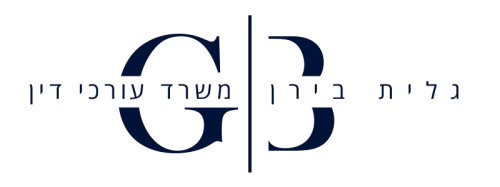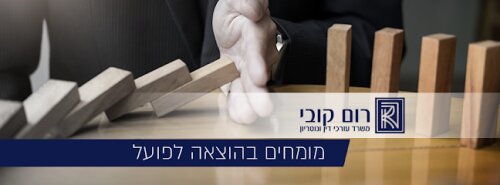Best General Litigation Lawyers in Ramat Gan
Share your needs with us, get contacted by law firms.
Free. Takes 2 min.
List of the best lawyers in Ramat Gan, Israel
About General Litigation Law in Ramat Gan, Israel
General Litigation in Ramat Gan, Israel, refers to the process of resolving disputes between individuals, companies, or organizations through the court system. It includes a wide range of civil matters, such as breaches of contract, property disputes, tort claims, employment conflicts, inheritance issues, and more. Ramat Gan operates under Israeli law, and cases are typically heard in the city’s Magistrate Court or District Court, depending on the nature and size of the claim. The litigation process in Ramat Gan follows the general procedures set forth in Israeli civil law, with specific adherence to local judicial practices.
Why You May Need a Lawyer
People in Ramat Gan may seek legal assistance in General Litigation for a variety of reasons. Common situations include:
- Being sued by another individual or company, or needing to file a lawsuit to protect your rights
- Contractual disputes, whether personal or business-related
- Disagreements over property or real estate matters, such as boundary or ownership disputes
- Claims arising out of injuries or damages (tort law)
- Employment disputes, such as wrongful termination or unpaid wages
- Debt collection cases or disputes regarding money owed
- Inheritance and estate conflicts between heirs
- Defamation, libel, or slander disputes.
A qualified lawyer can help you understand your rights and obligations, guide you through legal procedures, and represent your best interests in negotiations or court.
Local Laws Overview
General Litigation in Ramat Gan is governed by the Israeli judicial system. The following key aspects of local law are particularly relevant:
- Jurisdiction: Most civil litigation in Ramat Gan is heard in the Magistrate Court (small to medium claims) or the District Court (larger or more complex disputes).
- Civil Procedure: Legal proceedings follow the Israeli Code of Civil Procedure, which outlines steps such as pleadings, discovery, evidentiary requirements, and judgment.
- Time Limitations: Different types of cases have varying statutes of limitations, generally between 3 to 7 years from when the cause of action arose.
- Mediation and Alternative Dispute Resolution (ADR): Courts often encourage parties to first attempt mediation or negotiation before moving to a full trial, aiming for quicker and less costly resolutions.
- Legal Costs: The losing party may be required to pay some or all of the legal costs and court fees of the winning party, subject to the judge’s decision.
- Appeals: Generally, parties have the right to appeal a court’s decision within a specific timeframe.
Understanding these procedures is crucial for navigating the litigation process effectively in Ramat Gan.
Frequently Asked Questions
What is General Litigation?
General Litigation is the process of resolving legal disputes between two or more parties through the civil court system, covering issues like contracts, property, torts, and more.
Which courts handle litigation in Ramat Gan?
Most cases begin in the Ramat Gan Magistrate Court for claims up to the jurisdiction limit, and in the District Court for larger or more complicated cases. Some specialized cases may be assigned to other courts.
How long does it take to resolve a litigation case?
The duration varies depending on the complexity of the case, the court’s schedule, and whether appeals occur. Simple cases can take several months, while complex disputes may take years.
What are the costs involved in General Litigation?
Costs can include lawyer’s fees, court filing fees, expert witness fees, and possibly costs awarded to the other party if you lose. Some fees are fixed, while others depend on the amount in dispute.
Can I settle my dispute out of court?
Yes, many disputes are resolved through negotiation, mediation, or settlement agreements before reaching trial. Courts often encourage this to save time and costs.
What is the statute of limitations for filing a lawsuit?
The limitation period typically ranges from 3 to 7 years, depending on the type of claim. For example, contract disputes usually have a 7-year limit, while torts are typically 7 years.
Do I need a lawyer for litigation in Ramat Gan?
While you can represent yourself in court, it is highly advisable to have a qualified lawyer due to the complexities of legal procedures and the importance of presenting your case effectively.
What happens if I lose my case?
If you lose, you may be ordered to pay the other party’s legal costs and comply with any judgments or remedies imposed. You still retain the right to appeal within a set timeframe.
How do I find a qualified litigation lawyer in Ramat Gan?
You can consult the Israeli Bar Association, ask for recommendations, or use governmental directories to find experienced lawyers specializing in civil litigation in Ramat Gan.
Is mediation mandatory before filing a lawsuit?
Mediation is not always mandatory but is strongly encouraged in many cases. Some types of disputes may require an attempt at mediation before proceeding to court.
Additional Resources
If you need more information or assistance, you may consider reaching out to the following:
- Israeli Bar Association - Tel Aviv District: Provides information on lawyers and legal rights.
- Ramat Gan Magistrate Court: For case filing and status inquiries.
- Ministry of Justice - Legal Aid Department: Offers guidance and legal aid for eligible parties.
- Israeli Courts Website: Source for forms, procedures, and general information on litigation.
- Local mediation centers: For assistance with out-of-court dispute resolution.
Next Steps
If you are considering or facing General Litigation in Ramat Gan, here are steps you can take:
- Gather and organize all relevant documents and information related to your dispute.
- Contact a qualified litigation lawyer in Ramat Gan to discuss your case and explore your options.
- Understand the costs and potential outcomes before proceeding.
- Consider mediation or negotiation as an alternative to a lengthy court process.
- Stay informed about relevant deadlines, such as statutes of limitations for your type of claim.
- Attend all scheduled court proceedings or meetings as required and follow your lawyer’s advice closely.
Proper legal guidance can make a significant difference in the outcome of your case. Do not hesitate to seek professional help to protect your rights and interests.
Lawzana helps you find the best lawyers and law firms in Ramat Gan through a curated and pre-screened list of qualified legal professionals. Our platform offers rankings and detailed profiles of attorneys and law firms, allowing you to compare based on practice areas, including General Litigation, experience, and client feedback.
Each profile includes a description of the firm's areas of practice, client reviews, team members and partners, year of establishment, spoken languages, office locations, contact information, social media presence, and any published articles or resources. Most firms on our platform speak English and are experienced in both local and international legal matters.
Get a quote from top-rated law firms in Ramat Gan, Israel — quickly, securely, and without unnecessary hassle.
Disclaimer:
The information provided on this page is for general informational purposes only and does not constitute legal advice. While we strive to ensure the accuracy and relevance of the content, legal information may change over time, and interpretations of the law can vary. You should always consult with a qualified legal professional for advice specific to your situation.
We disclaim all liability for actions taken or not taken based on the content of this page. If you believe any information is incorrect or outdated, please contact us, and we will review and update it where appropriate.














